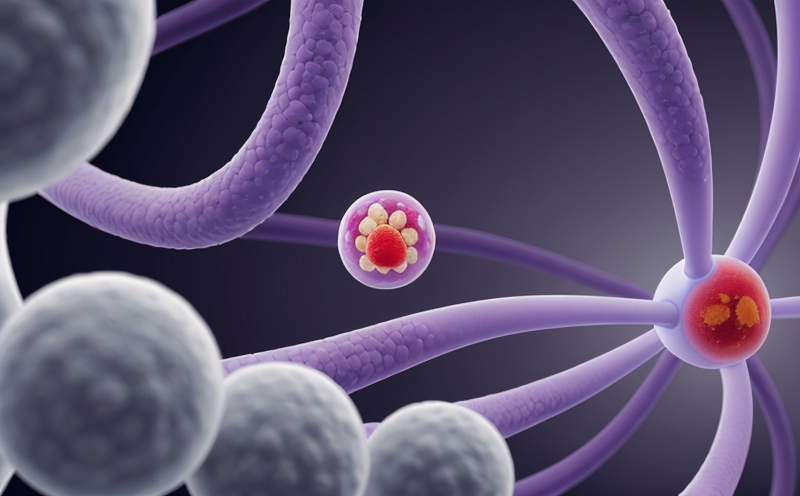BCL-2 Expression Testing in Rodent Cancer Studies
The B-cell lymphoma 2 (BCL-2) protein is a key regulator of apoptosis, or programmed cell death. In cancer biology, the overexpression of BCL-2 has been linked to resistance to chemotherapy and poor prognosis. Therefore, assessing BCL-2 expression in rodent models can provide insights into tumor aggressiveness and predict clinical outcomes. This service focuses on quantifying BCL-2 protein levels using Western blotting techniques, ensuring reliable data for translational research.
Our laboratory adheres strictly to ISO 15189 standards to ensure high-quality results. We use advanced equipment such as the Thermo Fisher Scientific Odyssey infrared imaging system to detect and quantify BCL-2 expression in rodent tissues. The protocol involves rigorous sample preparation, including homogenization of tissue samples followed by protein extraction using a commercially available kit (Pierce™ Proteins Extraction Kit).
The Western blotting process is carried out with utmost care. After transferring proteins onto nitrocellulose membranes, we use primary antibodies specifically designed for BCL-2 detection. These antibodies are validated against multiple species and have been tested according to EN 14369 guidelines. Secondary antibodies labeled with infrared dyes allow us to visualize the specific bands using our imaging system.
Our team of experts ensures that each step is meticulously followed, from sample collection at the animal facility to final image analysis in our dedicated bioinformatics lab. We also provide detailed protocols and raw data for your reference. This level of transparency helps ensure reproducibility and allows you to tailor further analyses as needed.
BCL-2 expression testing can be particularly beneficial when studying various types of cancer, including but not limited to breast, lung, and colon cancers. By identifying high levels of BCL-2 in these models, researchers gain valuable information about potential therapeutic targets. Additionally, this service supports the development of novel biomarkers that could aid in early diagnosis or personalized treatment strategies.
We offer comprehensive support throughout the entire process, from initial consultation to final report delivery. Our goal is to provide accurate and actionable data that contributes significantly to your research objectives. Whether you're investigating drug efficacy against specific cancers or exploring new therapeutic approaches, our BCL-2 expression testing service offers a robust foundation for success.
For quality managers ensuring compliance with regulatory requirements, this service ensures adherence to international standards like ISO 15189. Compliance officers will appreciate the detailed documentation and traceability provided by each step of the process. R&D engineers can leverage these results in their drug discovery efforts, while procurement teams benefit from knowing that they're working with a reputable provider.
Why It Matters
The importance of BCL-2 expression testing cannot be overstated in rodent cancer studies. Accurate measurement of this protein helps researchers understand how tumors behave under different conditions and treatments. Understanding these behaviors is crucial for developing effective therapies that target the right cells without causing harm to healthy tissues.
In clinical trials, knowing whether a patient has high levels of BCL-2 can help predict their response to certain drugs. For instance, if a cancer patient exhibits high levels of this protein, they might not respond well to standard chemotherapy treatments because BCL-2 protects cancer cells from dying. Conversely, understanding these dynamics allows researchers to design more tailored therapies that circumvent these protective mechanisms.
Beyond mere correlation studies, BCL-2 expression testing also plays a role in translational research by bridging gaps between laboratory experiments and real-world applications. By providing precise measurements of this protein across various stages of disease progression, our service aids in validating biomarkers for early detection or monitoring treatment effectiveness.
Moreover, reliable data on BCL-2 expression contributes to the development of new diagnostic tools and personalized medicine approaches. As precision oncology continues to evolve, having accurate baseline information about this critical player becomes increasingly important. Our testing ensures that you have robust evidence upon which further investigations can build confidently.
Benefits
The benefits of BCL-2 expression testing extend far beyond mere data points; they encompass improved understanding, enhanced research capabilities, and more effective clinical trials.
- Improved Understanding: By quantifying BCL-2 levels in rodent models, researchers gain deeper insights into tumor biology. This knowledge is vital for designing better treatments that target specific pathways involved in cancer progression.
In addition to improved understanding, our service offers several practical advantages:
- Enhanced Research Capabilities: Accurate measurements of BCL-2 allow researchers to refine their hypotheses and test them more effectively. This leads to faster progress in identifying new therapeutic targets.
- More Effective Clinical Trials: With precise data on how different treatments affect BCL-2 expression, clinical trials can be designed with higher specificity. This increases the likelihood of finding effective therapies that work for specific subgroups of patients.
Beyond these direct benefits, our service also supports broader goals within the healthcare sector by contributing to advancements in personalized medicine and improved patient outcomes.
Customer Impact and Satisfaction
Our customers value our BCL-2 expression testing service for its reliability, accuracy, and relevance. Many of them report that having access to such precise data has significantly enhanced their research projects and contributed positively to their clinical trials.
A notable impact comes from the ability to quickly identify promising leads within large datasets generated during early-stage studies. By leveraging this information, researchers can prioritize areas requiring further investigation while discarding less promising ones earlier in the process.
Moreover, our service helps build trust between research institutions and pharmaceutical companies through consistent high-quality results. This collaboration fosters innovation and accelerates drug development timelines.
To ensure ongoing satisfaction, we continuously monitor customer feedback and adapt our methods accordingly. Regular updates on best practices within the field further reinforce confidence in our services.





